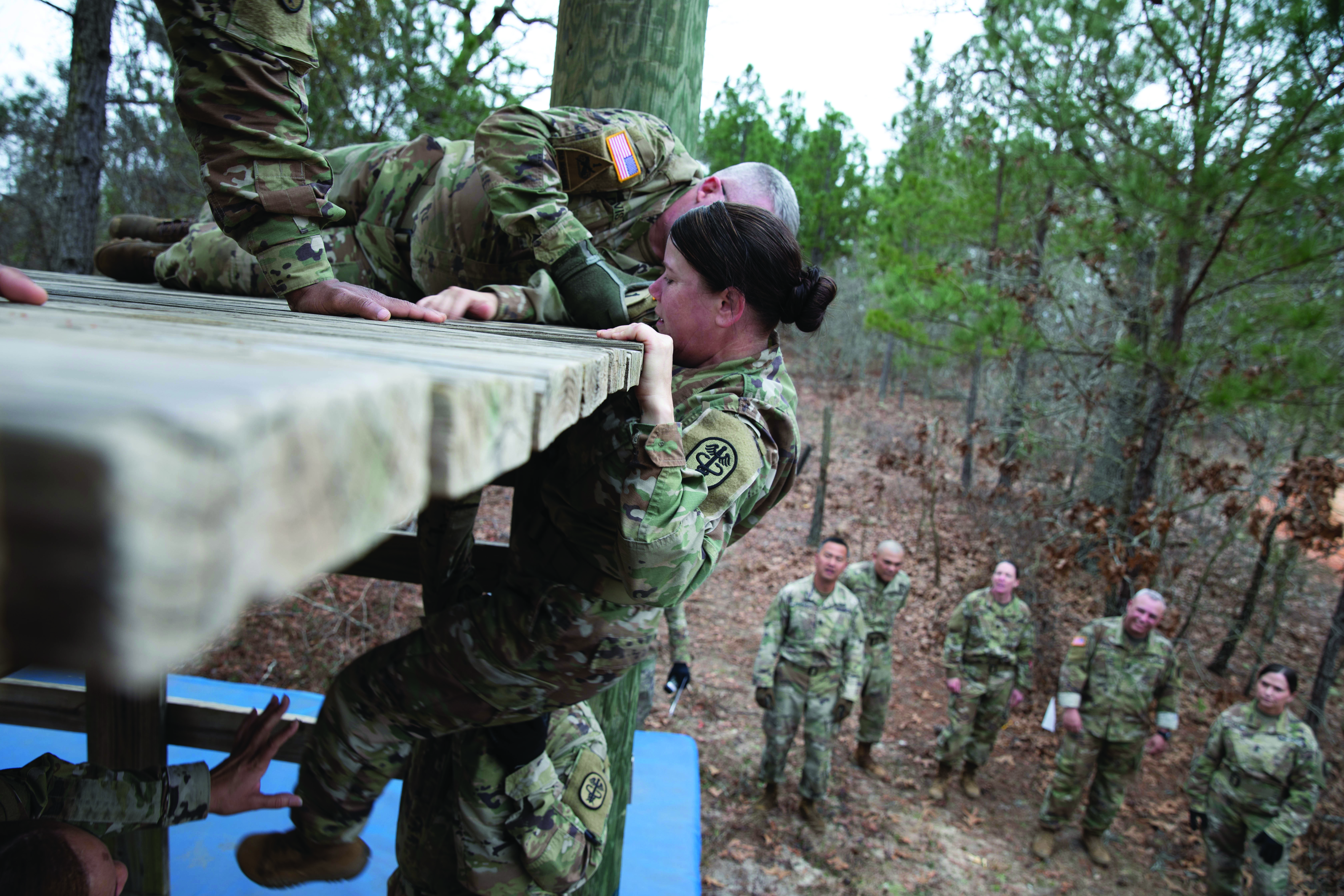
Command sergeants major work together to climb an open face tower at Fort Gordon, GA. (Credit: SPC Jordan Buck)
Court Is Assembled
Trust
The Foundation of Readiness
By Command Sergeant Major Osvaldo Martinez Jr.
For more than two centuries, the Army has taken great pride in its people—our most valuable weapon system. In the last few years, as we have focused much of our attention on readiness, have we consequently forgotten how to take care of our people? If we are focusing too much on readiness and neglecting our people, are we truly ready?
When the Army released the results of the 136-page report of the Fort Hood Independent Review Committee,1 many were taken aback by the results; however many were not. Everyone who read the report had an opportunity to study and reflect on the culture of not only Fort Hood, Texas, but of many of our military installations. At the end of the report, leaders were left to ask themselves, “Where do we go from here?”
The answer—in my opinion—is “trust.” Trust is one of the foundational principles of leadership, and must be developed to ensure readiness. It is pivotal that our Soldiers have trust in their leaders and in their organization—the unit to which they are assigned, and the Army in which they serve. We must work harder to earn the trust of our Soldiers, both enlisted and officer. Trust must be built daily and it must be built diligently, not only in words, but even more critically, with actions. Army Doctrine Publication 6-0, Mission Command: Command and Control of Army Forces, tells us that trust is derived from successful shared experiences and that mutual trust is a key component, if not the most important ingredient, to building cohesive teams.2 Ask yourself, “Are you taking the opportunity to build shared experiences with your team?” Doing the simple things can build high-performing teams with a foundation of trust: establish a common purpose; conduct team-building activities; recognize a job well done; and before anything else, lead from the front.
I recall an early morning at Fort Bliss, as I was lining up to begin the foot march for the German Armed Forces Badge for Military Proficiency, a familiar voice spoke to me. There were about one hundred Soldiers at the start line, all of us waiting to receive our instructions. I turned around to see who was calling out “Sergeant Major” to me; it was my Staff Judge Advocate (SJA), Colonel (COL) Chuck Poche. Colonel Poche stood there, just like me and the dozens of others, in full uniform with his ruck on his back. When I asked what he was doing there, he said he had nothing better to do that morning than to walk 12 kilometers with his Sergeant Major—it was a surprising and indelible moment that I will never forget. For the next hour and a half, he was there with me, every step of the way. We finished the 12-kilometer ruck march—together.

(Credit: Love the wind – stock.adobe.com)
There are many other significant memories I carry forward with me and that have impacted the way I think about leadership and caring for subordinates. Like the time my then-SJA, COL Karen Carlisle, and I jumped into a pool to save a Soldier who went down a pool slide and didn’t know how to swim, and when COL Lance Hamilton and I attempted to ride 100 miles in one day in Korea.
These leaders, among others, taught me the transformative power of shared experiences. We shared experiences that made it very easy for me to trust them then and still trust them today. Once we have earned the trust of our people, we must work to keep it. Once our Soldiers trust us as their leaders, they will always work hard to never let us or the organization down. Highly performing Soldiers build highly functioning organizations, and because we are tasked with the critical obligation to defend our Nation, we cannot afford any flaws in our weapon systems.
Once we have earned the trust of our people, we must work to keep it
When our Soldiers trust their leaders and the organization, they are more likely to trust the Army and its policies. They may not always agree with the outcomes of undertakings, but they are more likely to trust that the outcomes are fair. Trust allows meaningful conversations to occur between leaders and those they lead. These conversations inform leaders of what their Soldiers are going through and when they may need to shift or refocus their attention.
If we want to ensure that our most valuable weapon system is always ready, we must ensure we have earned—and maintain—our Soldiers’ trust. We cannot rely on policy alone to fix the challenges we face. Our challenges need to be addressed by leaders who know their Soldiers, and by Soldiers who trust their leaders. As Secretary of the Army James P. McCarthy stated on 8 December 2020, “But without leadership, systems don’t matter.”3 TAL
CSM Martinez is the Regimental Command Sergeant Major of The Judge Advocate General’s Corps.
Notes
1. Fort Hood Indep. Rev. Comm., Report of the Fort Hood Independent Review Committee (Nov. 6, 2020).
2. U.S. Dep’t of Army, Doctrine Pub. 6-0, Mission Command: Command and Control of Army Forces paras. 1-30 to -32 (July 2019).
3. Ryan D. McCarthy, U.S. Army Sec’y, Army Leaders and Committee Members Brief Reporters on Findings and Recommendations of the Fort Hood Independent Review Committee (Dec. 8, 2020).